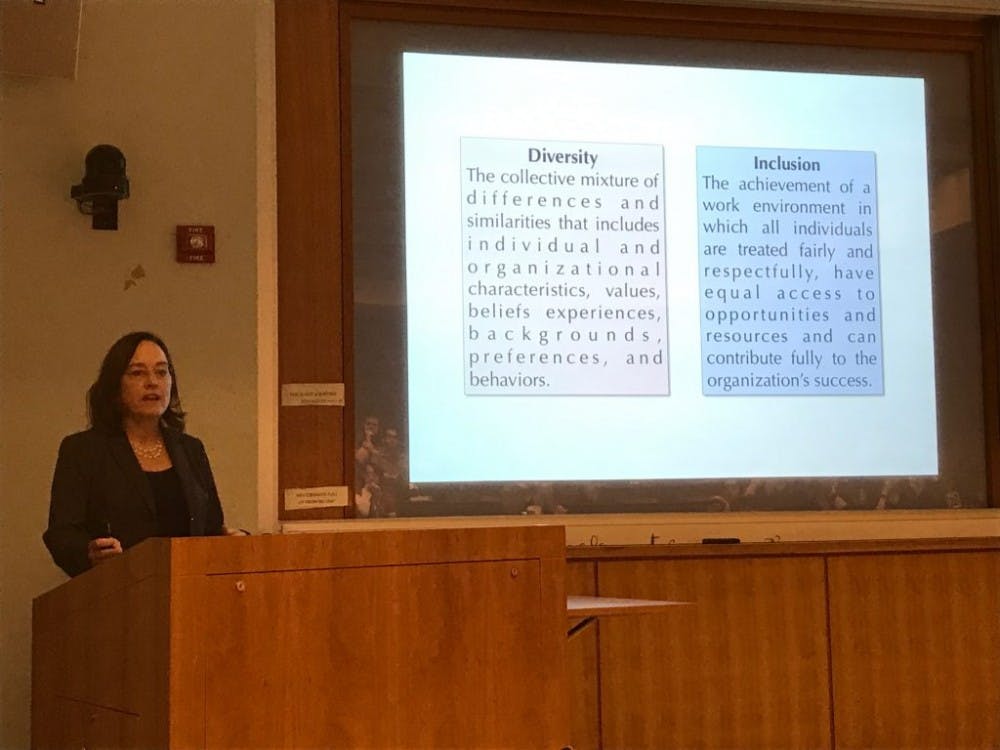Karen Fleming, a Hopkins biophysics professor, spoke about discrimination and inherent biases against women in Science, Technology, Engineering and Mathematics (STEM) fields on Wednesday. She also touched on the importance of diversity and inclusion and the systematic oppression of self-confidence in women. The talk was co-sponsored by Hopkins Feminists and The Triple Helix at JHU.
Though her talk specifically focused on the experience of women in STEM, Fleming said that her observations and conclusions applied to women across professional fields and to the experiences of underrepresented minorities (URMs).
Fleming began by discussing how diversity and inclusion contributes to an organization’s success.
“Hundreds and hundreds of studies show that women and men have equal capability in the STEM fields,” she said. “They should be represented equally in these fields, and they’re not.”
She remarked that while the diversity of institutions like Hopkins is increasing, it does so at about 0.1 percent per year. While she expressed frustration with this rate, she acknowledged that the University is heading in the right direction.
“There’s a big push right now at Hopkins to increase diversity, especially among the faculty,” she said. “I really have been amazingly surprised and pleased.”
Fleming said that it is important for both women and men to understand the way the system works so that they can work through the problem of bias against women. Using the analogy of a leaking faucet, she explained why the system has not changed to be more inclusive.
“Do you blame the water?” she asked. “You might cuss at the water, especially if there’s a lot of water, but you don’t blame the water. You say that there’s a problem in the pipeline, and you fix the pipeline. We don’t need to blame the women who are leaving, we need to understand why they’re leaking out of the professional pipeline to begin with.”
The University’s Report on Faculty Composition released in September indicates that the number of women in a field decreases after every professional transition, which Fleming said is at least partly because women feel underrepresented and oppressed in the workplace.
According to the report, the percentage of female professors decreases between junior and senior ranks, with women comprising 48 percent of assistant professors, 39 percent of associate professors and only 24 percent of full-time professors. The report attributes this to the University’s hiring practices and what it calls long-term attrition against women.
Fleming also said that part of the bias against women comes from their having lower confidence and expectations for their careers because they are socially conditioned to assume inferiority to men.
“This issue is not an issue of men versus women,” she said. “It’s not that men faculty were discriminating and the women faculty not. It’s both. It’s everywhere. All of us hold these gender biases, all of us have some version of these expectations. This is a community problem.”
Although she said that this is not a problem to be solved entirely by men or women, Fleming did indicate that it is important for men to be active bystanders in situations of injustice.
“It is more effective if a non-target ally is the one who intervenes,” she said
Morgan Nance, a first-year graduate student, said that it was important for women to develop their own self confidence so they would not have to rely on the intervention from a bystander.
“One of the things I’ve found that helps me is when I watch little videos where they over-exemplify the way women will start everything with ‘I’m sorry,’” Nance said. “People can be more confident when they’re shown when other people aren’t confident and how that seems silly.”
Freshman Sehej Parmar, the Triple Helix event coordinator, explained how she goes about feeling more confident.
“You validate yourself, you tell yourself all the good things about yourself, all the accomplishments that you’ve done, and that makes you feel better and gives you a lot of confidence,” she said.
Freshman Kathy Le, a member of Triple Helix, said that developing self-confidence was important to her personally, particularly during college, a time of constant evaluation.
“If I ever catch myself feeling negative about myself, I ask myself why I am feeling like this,” Le said. “Is it because of an implicit bias I have against myself? I try to unravel it in that way.”
Le said that this was difficult because of how pervasive this implicit bias is in society, alongside overt sexism that still exists.
“People need to understand that such bias is hidden and woven into society,” she said. “There’s people who make sexist jokes just in the idea of humor. It’s not supposed to mean anything, but when you hear those over and over it begins to mean something. People begin to think it’s okay to make sexist jokes, and it goes further than that.”
Parmar agreed that the problem of bias against women was more important than some people realized, particularly those who do not experience it daily.
“This is a really important topic, but not a lot of emphasis is put on it,” she said. “People don’t think it’s that big of an issue right now, but for people who actually experience it it’s a pretty big deal. You feel the effects quite often in your academic career.”





